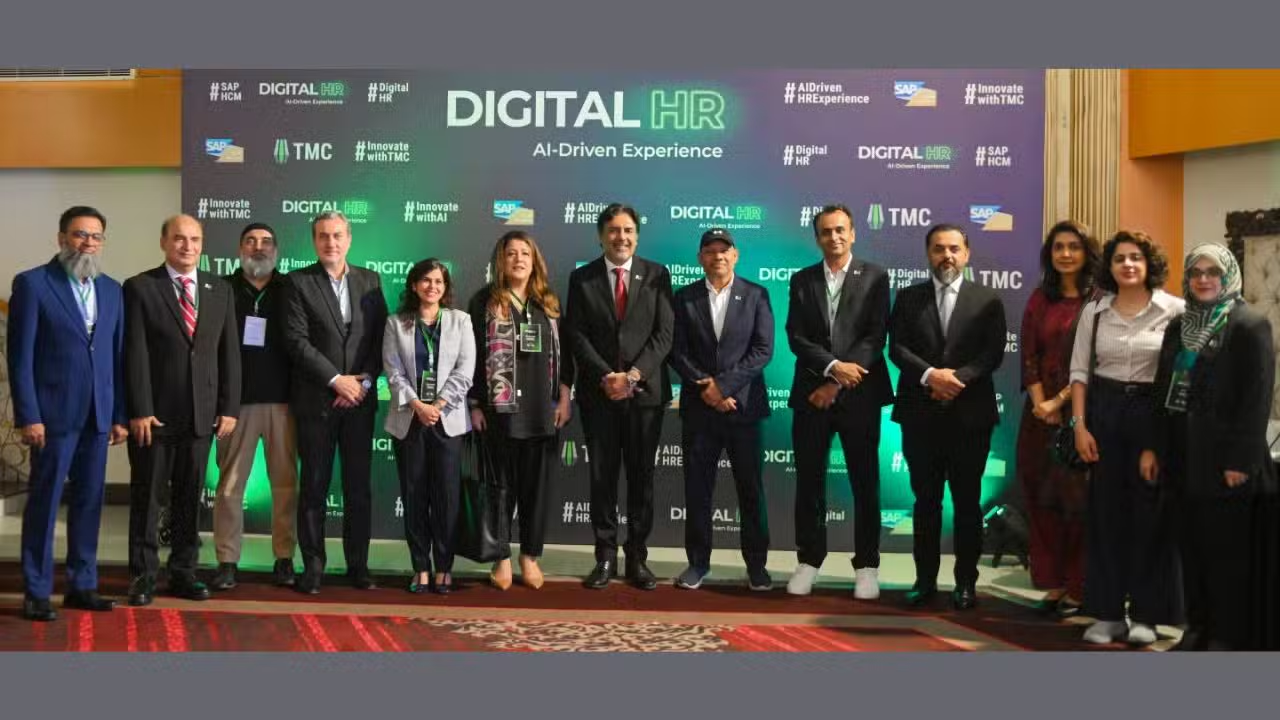In a decisive step toward reimagining the future of work, Digital HR took center stage in Karachi at the Digital HR, AI-Driven Experience conference, jointly organized by TMC Pvt. Ltd. and SAP Pakistan. Timed to coincide with Pakistan’s Independence Day, the event framed digital HR transformation as not just a business trend, but a national imperative, positioning people strategy as the backbone of a smarter, more resilient economy.
Why Digital HR Matters for Pakistan’s Economic Future
Digital HR is no longer a choice—it’s a necessity. Currently, only 34% of organizations in Pakistan have fully integrated digital HR functions, a statistic that underscores the urgency for transformation. In an era where artificial intelligence (AI) and data analytics are redefining business operations globally, Pakistan’s workforce must be empowered through advanced tools and strategies to remain competitive.
According to Saquib Ahmad, Country Managing Director at SAP Pakistan, Iraq, Afghanistan, and Bahrain, SAP’s SuccessFactors Human Capital Management (HCM) solution is enabling forward-thinking organizations to build agile, skill-based workforces. “Digital HR will serve as the foundation of a smarter Pakistan,” Ahmad emphasized, highlighting its potential to strengthen the country’s position in the global knowledge economy.
AI as the Enabler, Human Experience as the Compass
Abdul Haseeb, Managing Director & CEO of TMC Pvt. Ltd., made it clear that Digital HR isn’t just about technology. “This event isn’t about buzzwords,” he said. “It’s about igniting a national conversation on how Pakistan hires, trains, and scales its talent. With AI as the enabler and human experience as the compass, Digital HR is the blueprint for tomorrow’s workforce.”
By placing human experience at the center, digital HR systems can not only streamline administrative processes but also foster engagement, retention, and long-term growth. This shift moves HR away from a purely transactional role and toward becoming a strategic driver of innovation.
Insights from Industry Leaders
The conference brought together leading organizations such as Engro Corporation, Tapal Tea, Pakistan Cables, and Lucky Core to discuss how Digital HR is shaping their strategies. The expert panels covered critical themes, including:
- Workforce Upskilling: Building future-ready talent through targeted learning programs and AI-driven skill mapping.
- Generational Transitions: Navigating the challenges and opportunities of a multigenerational workforce.
- Talent Retention: Using predictive analytics to identify and retain top performers.
- Strategic HR Transformation: Shifting from administrative tasks to data-driven, growth-focused decision-making.
These discussions emphasized that digital HR transformation requires more than just software adoption—it demands a cultural shift in how organizations value and invest in their people.
The Global Context of Digital HR
Around the world, companies are embracing digital HR solutions to increase productivity and improve employee satisfaction. Research from Deloitte shows that organizations with advanced digital HR systems report 32% higher employee engagement and 27% faster decision-making. For Pakistan, where economic resilience depends heavily on skilled human capital, the adoption of digital HR could accelerate national growth by enhancing workforce agility and innovation capacity.
Bridging the Skills Gap Through Digital HR
One of the key challenges Pakistan faces is a widening skills gap, especially in sectors like technology, engineering, and digital marketing. Digital HR tools can help close this gap by providing real-time insights into skill shortages, recommending personalized learning paths, and tracking progress through performance analytics. This enables companies to adapt quickly to market demands and ensure employees are continuously evolving.
A National Imperative for Transformation
Framing the conference around Pakistan’s Independence Day was more than symbolic—it was a reminder that national progress depends on how the country manages and nurtures its human capital. As industries across the globe evolve at an unprecedented pace, failing to adopt Digital HR could leave Pakistan at a competitive disadvantage.
Abdul Haseeb’s call to action summed it up perfectly: the future of Pakistan’s economy hinges on its ability to hire, train, and scale talent effectively, with AI and human-centric design working hand in hand.
The Road Ahead for Digital HR in Pakistan
While only about a third of organizations in Pakistan have embraced digital HR, momentum is building. Events like Digital HR, AI-Driven Experience play a crucial role in educating leaders, sharing success stories, and fostering collaboration between technology providers and industry stakeholders.
To fully realize the benefits of digital HR, companies will need to:
- Invest in Cloud-Based HR Platforms that integrate AI, analytics, and mobile accessibility.
- Prioritize Employee Experience to boost engagement and retention.
- Leverage Data-Driven Insights for strategic workforce planning.
- Foster a Culture of Continuous Learning to adapt to shifting market demands.
Building a Smarter Pakistan Through Digital HR
The Digital HR, AI-Driven Experience conference was more than just a meeting of industry minds—it was a pivotal moment in Pakistan’s journey toward a smarter, more resilient economy. By embracing Digital HR, the country can unlock its full workforce potential, bridge the skills gap, and compete on a global scale.
As AI-powered solutions become more accessible and cultural barriers to digital adoption continue to break down, the next few years will be critical. Pakistan’s success will depend on how quickly and effectively it can transform its HR functions into strategic, future-ready systems that place people at the heart of progress.



